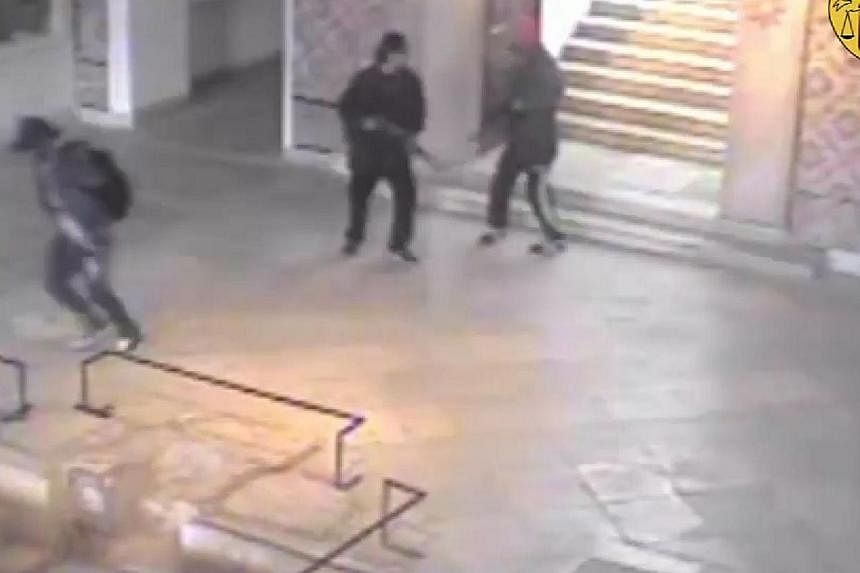PARIS (AFP) - A third gunman in the massacre of tourists in Tunisia's Bardo Museum is still at large after two others were killed, Tunisian President Beji Caid Essebsi said Sunday.
"Definitely there were three," Essebsi told France's iTele television and Europe 1 radio. "Two were killed, but there is one who is now on the run," he said. "In any case, he will not get very far."
The attack on the Bardo museum in Tunis on Wednesday killed 21 people, all but one of them foreign tourists, and was claimed by the Islamic State in Iraq and Syria (ISIS) group.
It came as Tunisia - the birthplace of the Arab Spring that held its first free elections last year - struggles with rising Islamic extremism.
Authorities on Saturday released CCTV footage from the attack showing two black-clad gunmen with automatic weapons walking unimpeded though a large lobby, with a time stamp showing just after noon.
The grainy black-and-white footage then shows the gunmen passing an unidentified male. They point an automatic weapon at him briefly before allowing him to flee as they make their way up a staircase.
After rampaging through the museum for several hours, the two gunmen were killed in an assault by security forces. Essebsi on Saturday admitted that more could have been done to prevent the attack, which raised fears for the future of Tunisia's vital tourism industry.
"There were failures" which meant "the police and intelligence were not systematic enough to ensure the safety of the museum", Essebsi told weekly Paris Match weekly in an interview. But he said security forces "responded very effectively to quickly put an end to the attack at the Bardo, certainly preventing dozens more deaths if the terrorists had been able to set off their suicide belts".
CALLS FOR ACTION
Officials had earlier admitted that guards supposed to be protecting the museum and the nearby parliament were having coffee at the time of the assault.
Tunisian authorities have arrested more than 10 people believed to be directly or indirectly involved in the attack, including relatives of one of the gunmen. An arrest warrant was also issued for a Tunisian named Maher Ben Mouldi Kaidi for suspected involvement.
The dead tourists were four Italians, three Japanese, three French, two Spaniards, a Colombian, an Australian-Colombian, a British woman, a Belgian woman, three Poles and a Russian. A Tunisian policeman was also killed.
In its first claim of a major attack in Tunisia, ISIS said it was behind the assault and threatened more. Authorities said the gunmen had trained in neighbouring Libya, where ISIS is believed to have camps.
Tunisia has seen an upsurge in Islamist extremism since the 2011 revolution that ousted dictator Zine El Abidine Ben Ali and sparked the Arab Spring. The country has taken pride in forming a democratic government and achieving stability since the Arab Spring - in marked contrast to nations such as Egypt and Libya.
But dozens of police and military personnel have been killed in attacks blamed on Islamist militants. The museum attack has left Tunisia reeling, with newspapers on Sunday calling for authorities to do more to combat extremism.
"What's essential now is to really take action," French-language daily Le Quotidien wrote, calling for more state oversight of mosques, especially those "under the influence of uncontrollable religious fanatics". Newspaper Le Temps called for "urgent draconian measures" including withdrawing Tunisian citizenship from "terrorists who pledge allegiance to the enemy".
Authorities say as many as 3,000 Tunisians have gone to Iraq, Syria and Libya to join ISIS and other extremist groups, raising fears of returning battle-hardened militants plotting attacks.

